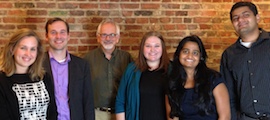MBA Teams New Tool For Education Initiative
Thursday, December 10, 2015
Call it happenstance. Maybe even serendipity.
But Perry Samson has another way to describe it. “It was a gift,” he said.

How else to explain the chance meeting between Samson, a professor at U-M, and Amy Gillett, vice president of WDI’s Education Initiative, at a January 2015 Ross School of Business summit on the future of education.
Samson had developed a new active learning platform for classrooms called LectureTools and wanted to explore if his new application would be useful in other countries. Among its features, LectureTools captures video of lectures, allows students to ask questions using their laptop during a professor’s presentation, and lets instructors pose questions in real time to gauge if students understand the material.
WDI and Gillett had longtime partner school – the Stockholm School of Economics in Riga, Latvia (SSE Riga) – whose leadership was receptive to new technology and innovation. And Gillett could deploy an MBA team from Ross to see if Samson’s tool would be a fit in Riga and other markets.
“I thought his tool could improve the quality and reach of management education there,” Gillett said of SSE Riga. “I immediately proposed the student team. They would be able to find out if this was appropriate technology for the school, if the faculty and students saw the value, and if so, what the benefits were and how LectureTools could best be adapted for the Latvian market, and by extension, other emerging markets.”
Samson, the Arthur Thurnau Professor in the Department of Atmospheric, Oceanic, and Space Sciences, as well as founder of LectureTools, loved the suggestion.
“The timing was excellent,” he said. “As a small company, we always try to identify better ways to do our work.”
In June 2015, four Evening MBA students from Ross traveled to Riga as part of the school’s Multidisciplinary Action Projects (MAP) program. MAP is an action-based learning course offered at Ross during which students tackle a real-world strategic project under the guidance of faculty advisors.
The students were tasked with conducting an assessment of the Latvian market for Echo 360, the active learning technology company that bought Samson’s LectureTools. They also developed a market entry strategy for Echo360’s growth into Latvia and other emerging markets.
The student team interviewed faculty, administrative staff, and students at SSE Riga. They conducted secondary research on the higher education technology field to better understand how technology is adopted at universities. They also looked at demographic trends within the Latvian higher education system.
“It was far beyond what Echo 360 could do,” Samson said.
He said the students were “remarkable, enthusiastic. They thought of a number of things I didn’t think of.
“They provided good insight on what drives adoption of technology in education and identified a number of suggested process changes,” Samson said.
Gillett said WDI’s Education Initiative works to improve the delivery of management education in emerging markets through a variety of ways. One way is to pair MAP teams with WDI partner on any number of projects.
“This is a great way for us to help our partners explore innovative ways to deliver management education for the 21st Century,” Gillett said. “WDI’s Education Initiative will take the learnings from this project and others like it and serve as a hub for how to make management education more efficient, effective, and accessible in the future.”
Gillett says the project was well received by the Ross students. “The students on the MAP team loved working on the project. There was a big demand to be part of the project.”
Allie Schachter was one of the student team members and said she enjoyed applying what she had learned in the classroom to a real-world business problem. (Watch a video of Schachter talking about the MAP project here.)
“My MAP experience solidified and contextualized many of the concepts discussed in class, which was an incomparable educational experience,” she said. “It was a great opportunity to work with a group on a very large and involved project. Throughout the course of our project, we honed our ability to work together, delegated tasks to one another, and navigated difficult conversations and challenges together.
“It was a really great opportunity to gain experience working for and with others. I will certainly carry those experiences forward when working with teams at work and in future classes.”
Samson said he too learned a lot and is grateful to Gillett and the student team.
“It was a wonderful interaction,” he said. “It was invigorating for me to sit down and have conversation with someone who is thinking more deeply about all these things.”
